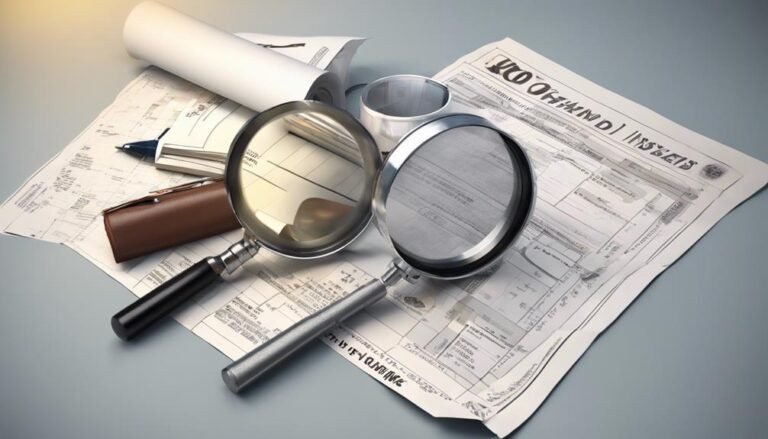Insurance for Business Owners
As a business owner, securing insurance is essential for safeguarding your company against financial risks. Types like property and liability coverage offer protection from unexpected events and legal liabilities. Guarantee your assets and investments are shielded with the right policies. Don’t overlook essential options like workers’ compensation and cyber insurance, tailored to your business needs. Budget wisely to balance cost and coverage effectively. Remember, proper insurance not only protects your business but also ensures its continuity. Keep exploring to discover more ways insurance can benefit your business.
Key Takeaways
- Identify specific insurance needs based on business risks and assets.
- Invest in property and liability coverage for comprehensive protection.
- Consider budget constraints when selecting appropriate coverage.
- Understand the importance of workers’ compensation and key person insurance.
- Regularly review and update insurance policies to ensure adequate coverage.
Importance of Business Insurance
Business insurance is vital for protecting your company from potential financial risks and liabilities. By investing in the right insurance policies, you’re effectively managing risks that could otherwise jeopardize your business’s financial security. This proactive approach not only guarantees business continuity but also provides legal protection in case of unforeseen circumstances.
Risk management is an essential aspect of running a successful business. With the right insurance coverage, you can safeguard your company against various risks such as property damage, liability claims, or interruptions in operations. This allows you to focus on growing your business without constantly worrying about potential financial setbacks.
Furthermore, having business insurance in place offers you and your employees a sense of financial security. In the event of a crisis, such as a natural disaster or a lawsuit, insurance can help cover the costs and prevent significant financial losses.
Ultimately, investing in business insurance is a wise decision that protects your company’s future and ensures its sustainability.
Common Types of Business Insurance
As a business owner, it’s important to have insurance coverage for property damage and liability protection options.
Property insurance can safeguard your physical assets like buildings and equipment, while liability coverage can protect you from legal claims if someone is injured on your property or due to your products or services.
Understanding these common types of business insurance is essential for safeguarding your business and ensuring its long-term success.
Coverage for Property Damage
Safeguarding your business assets and tools from potential damage is essential, and having the right types of insurance in place can provide you with the necessary coverage. For contractors and small business owners, this often means equipment cover, which helps safeguard essential tools and assets. The coverage, as explained by Contractor Cover, a well-established contractor insurance provider, can be bundled and may vary depending on the policy. That said, many plans include protection for theft from secured locations, fire or water damage, and damage caused by vehicle-related incidents.
For larger businesses, commercial property insurance is commonly used to safeguard buildings and assets. It is often more comprehensive, covering higher-value equipment, multiple locations, and more complex operational risks. To illustrate this further, here is a breakdown of common types of property insurance coverage:
| Coverage Type | Description |
|---|---|
| Building Coverage | Protects the structure of your business premises. |
| Business Personal Property | Covers equipment, inventory, and furniture within your business. |
| Business Interruption | Helps cover lost income and expenses during a temporary closure due to covered damages. |
| Equipment Breakdown | Provides coverage for repair or replacement of essential machinery. |
| Flood Insurance | Protects against damages caused by floods. |
Ensuring that you have the right property insurance with suitable coverage limits is a proactive step in safeguarding your business against unforeseen property damage.
Liability Protection Options
Protecting your business from potential legal liabilities is a vital aspect of risk management, and having the right types of insurance can provide you with the necessary coverage.
When it comes to liability protection options, there are several key types of insurance that can safeguard your business. General Liability Insurance is essential, offering coverage for bodily injury, property damage, and legal defense costs.
Professional Liability Insurance, also known as Errors and Omissions Insurance, protects against claims of negligence or inadequate work.
Product Liability Insurance is critical for businesses that manufacture or sell products, covering legal costs in case a product causes harm.
Cyber Liability Insurance shields against data breaches and cyber-attacks, providing financial protection and peace of mind.
Property and Asset Protection
Ensuring the security of your business’s physical assets and property is an essential aspect of risk management that can’t be overlooked. Protecting your property and assets not only safeguards your investments but also contributes to the financial stability of your business.
By implementing property and asset protection measures, you can mitigate potential risks such as theft, damage, or natural disasters that could otherwise jeopardize your operations.
One key strategy for property and asset protection is securing thorough insurance coverage. Property insurance can provide coverage for your building, equipment, inventory, and other physical assets in case of unforeseen events. This insurance can help you recover financially and get your business back on track quickly in the event of a covered loss.
Additionally, investing in security systems, regular maintenance, and disaster preparedness plans are proactive steps you can take to minimize risks and protect your property. By prioritizing property and asset protection, you aren’t only safeguarding your physical assets but also ensuring the long-term financial stability of your business.
Liability Coverage for Businesses
Now, let’s discuss Liability Coverage for Businesses.
Understanding the types of liability your business may face, setting appropriate coverage limits, and considering cost factors are essential aspects to protect your business from potential financial risks.
Types of Liability
Liability coverage for businesses is essential in safeguarding your company against financial risks associated with legal claims and lawsuits. As a business owner, understanding the types of liability insurance available is pivotal for effective risk management and compliance with legal requirements.
General liability insurance is a fundamental policy that protects your business from claims related to bodily injury, property damage, or advertising injury. It provides coverage for legal costs and settlements if your business is sued for these reasons.
Professional liability insurance, also known as errors and omissions insurance, is vital for service-based businesses to protect against claims of negligence or inadequate work.
Product liability insurance is crucial for businesses that manufacture or sell products, covering costs related to injuries or damages caused by the products.
Coverage Limits
To adequately protect your business from financial risks associated with legal claims and lawsuits, understanding the coverage limits of your liability insurance is vital. When it comes to coverage limits, it’s important to assess your business’s potential risks and select appropriate limits that can effectively safeguard your assets. Here is a table outlining key aspects of coverage limits:
| Aspect | Description | Importance |
|---|---|---|
| Coverage Options | Choose between general liability, professional liability, and product liability coverage options. | Tailoring coverage to needs |
| Policy Exclusions | Be aware of any specific situations or risks that are not covered by your liability insurance policy. | Avoiding coverage gaps |
| Claim Process | Understand the steps involved in filing a claim and make sure you have the necessary documentation. | Speedy resolution |
Moreover, it’s crucial to be aware of coverage extensions that may enhance your policy’s protection. By being knowledgeable about these aspects, you can ensure your business is well-protected against potential liabilities.
Cost Considerations
Understanding the cost considerations of your liability coverage for businesses is key to ensuring you maintain adequate financial protection against potential risks and legal claims.
When evaluating different insurance options, conducting a premium comparison is important. While it may be tempting to opt for the cheapest coverage available, it’s crucial to remember that lower premiums could mean less coverage or higher deductibles. By comparing premiums from various insurers, you can find a balance between cost and coverage that suits your business needs.
Budget planning is another important aspect of managing the cost of liability coverage. Setting aside a specific amount for insurance expenses in your budget ensures that you can afford the necessary coverage without compromising other financial obligations. By proactively including insurance costs in your budget planning, you can avoid any last-minute financial strain when premiums are due.
Workers’ Compensation Insurance
When operating a business, ensuring your employees are protected in case of work-related injuries is essential, which is where Workers’ Compensation Insurance comes into play. This type of insurance provides coverage for medical expenses and lost wages for employees who are injured on the job. Workers’ Compensation Insurance not only protects your employees but also shields your business from potential lawsuits related to workplace injuries.
| Claim Process | Premium Rates |
|---|---|
| Report incident promptly to employer | Premiums based on industry risk |
| Employer files claim with insurance company | Experience modifier affects rates |
| Medical treatment begins | Safety measures can reduce premiums |
| Employee returns to work when possible | Audit may adjust premium at year-end |
Understanding the claim process is vital for a smooth experience when utilizing Workers’ Compensation Insurance. Additionally, knowing how premium rates are calculated can help you make informed decisions to safeguard your employees and business. By investing in this insurance, you demonstrate your commitment to your employees’ well-being while protecting your business from financial burdens associated with workplace injuries.
Business Interruption Insurance
Business Interruption Insurance provides coverage for lost income and operating expenses when your business is unable to operate due to covered perils such as natural disasters or other unforeseen events. This type of insurance can be pivotal in helping your business stay afloat during challenging times. Here are some key points to ponder:
- Claims Process: In the unfortunate event of a business interruption, promptly notifying your insurance provider and initiating the claims process is essential. This will help expedite the evaluation of your claim and the subsequent disbursement of funds.
- Coverage Details: Understanding the specific events covered by your policy is essential. Make sure you’re aware of the extent of coverage for both income loss and ongoing expenses to mitigate financial risks effectively.
- Policy Exclusions and Risk Assessment: Familiarize yourself with any exclusions in your policy to avoid surprises when making a claim. Additionally, regularly reevaluating your risk exposure can help in determining the adequacy of your coverage.
Business Interruption Insurance serves as a safety net for your business, offering financial protection when unforeseen circumstances disrupt your operations. By thoroughly evaluating your coverage and diligently following the claims process, you can safeguard your business’s financial stability.
Key Person Insurance
To protect your business from potential financial losses due to the absence of a key individual, Key Person Insurance provides coverage that can be essential for maintaining stability and continuity.
Key Person Insurance is a policy that specifically covers individuals who play a vital role in the operation and success of your business. Premium rates for Key Person Insurance can vary based on factors such as the key person’s age, health, and the coverage amount needed. The policy benefits of Key Person Insurance typically include coverage for financial losses incurred from the key person’s inability to work due to illness, disability, or death.
When applying for Key Person Insurance, the underwriting process involves evaluating the key person’s significance within the company, their contribution to revenue, and the potential financial impact of their absence.
In the unfortunate event that a claim needs to be made, the claim process for Key Person Insurance usually requires providing documentation of the key person’s condition or passing, along with any other relevant information to support the claim.
Key Person Insurance is a valuable tool for safeguarding your business against the financial repercussions of losing a key individual.
Cyber Insurance for Businesses
Cyber insurance, a vital component of modern business risk management, provides coverage against financial losses resulting from cyberattacks and data breaches. In today’s digitally driven world, protecting your business from potential cyber threats is essential.
Here are some key points to keep in mind:
- Risk assessment: Conducting a thorough risk assessment is pivotal in understanding your business’s vulnerabilities to cyber attacks. Identifying potential weak points in your cybersecurity infrastructure can help tailor your insurance coverage to mitigate specific risks.
- Cyber attacks: With the increasing frequency and sophistication of cyber attacks, having a robust cyber insurance policy in place can provide financial protection in the event of a breach. From ransomware to phishing scams, cyber insurance can help cover the costs associated with investigating and remedying the attack.
- Coverage options: When choosing a cyber insurance policy, take into account the coverage options available. Policies can vary in terms of coverage limits, response services, and legal support. Selecting the right combination of coverage options tailored to your business’s needs is essential for thorough protection against cyber threats.
Insurance Considerations for Small Businesses
Considering the unique risks faced by small enterprises, it’s essential to address specific insurance considerations that can safeguard your business assets and operations effectively. Conducting a thorough risk assessment is the first step in determining the insurance coverage needed for your small business. Identify potential risks such as property damage, liability claims, or business interruption, and then explore suitable coverage options that address these specific vulnerabilities.
When it comes to insurance for small businesses, policy customization is vital. Tailoring your insurance policies to match the individual needs of your enterprise ensures that you’re adequately protected without overpaying for unnecessary coverage. Work closely with your insurance provider to understand the policy customization options available and create a plan that aligns with your budget and risk management goals.
Budget planning is an important aspect of insurance considerations for small businesses. While you aim to secure tailored coverage, it’s essential to keep your budget in mind and strike a balance between protection and affordability. Regularly review your insurance policies and make adjustments as your business evolves to ensure continuous and adequate protection.
Frequently Asked Questions
Can Business Insurance Cover Employee Theft?
Yes, business insurance can provide coverage for employee theft. It helps prevent theft by offering financial protection. Be aware of coverage limits for employee dishonesty and the consequences of not having adequate insurance in place.
Is Business Insurance Mandatory for All Businesses?
Business insurance isn’t always mandatory, but depending on your business size and industry, there may be legal requirements. Some exemptions exist, but it’s wise to protect your investment with coverage tailored to your specific needs.
What Does Errors and Omissions Insurance Cover?
You might think errors and omissions insurance is just another policy. In reality, it shields you from legal liability due to professional negligence. This coverage safeguards your business from costly lawsuits.
Are Business Vehicles Covered Under Standard Insurance?
Yes, business vehicles are typically covered under commercial auto policies. These policies provide property damage protection in case of accidents involving your company’s vehicles. It is crucial to confirm you have the right coverage for your business vehicles.
Does Business Insurance Protect Against Natural Disasters?
Alright, so you’re wondering if business insurance covers natural disasters. Yes, it typically includes property damage caused by natural disasters. However, check the policy for specific coverage details and exclusions. The claim process may vary.
Conclusion
As a business owner, it’s essential to protect your hard work and investments with the right insurance coverage. Don’t leave your business vulnerable to unexpected risks and liabilities.
Remember, insurance is the safety net that can help you weather any storm that comes your way. So, make sure to choose the right policies that suit your business needs and give yourself the peace of mind you deserve.
After all, when it comes to your business, it’s better to be safe than sorry.








